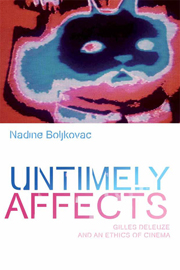Conclusion
Published online by Cambridge University Press: 05 September 2013
Summary
Inasmuch as the works of Marker, Resnais and Deleuze repeatedly encounter certain limits of film, thought and self as they revisit wounds and replay events of a recent past, this study has confronted limits of its own. Moved by tracking shots that persist along barbed-wire camp enclosures, and along the streets and river banks of Hiroshima-Nevers; captivated by ‘freeze’ frames of staring women on the islands of Cape Verde, and by glances within the undergrounds of the Métro; haunted by images of a pre-war Paris, and those of a post-annihilated Paris; and entranced by a heartbeat that resounds through the madness, haecceities or love between one body, face, city, time and another, these pages have embraced an experiential method to think beyond impasses of mimetic representation and authoritative history. Nevertheless, even a focus upon the material and tangible, ever in relation to transient yet lingering sensations of suffering and loss, cannot discharge the power and force of the films.
This book has attempted, however, to assess and evoke Marker, Resnais and Deleuze's own interrogative methods that thoroughly explore, in the manner of a revelatory ‘schizoanalysis’ or empiricism, molecular and variable operations beneath our ‘molar’ structures and organisations. As their respective schizoanalyses consider what exists between relations, their works in effect undercut the ‘great molar organization that sustains us’, ‘the binary machines that give us a well-defined status’, the ‘values, morals, fatherlands, religions and private certitudes [of] our vanity and self-complacency’ (ATP: 227).
- Type
- Chapter
- Information
- Untimely AffectsGilles Deleuze and an Ethics of Cinema, pp. 172 - 177Publisher: Edinburgh University PressPrint publication year: 2013



